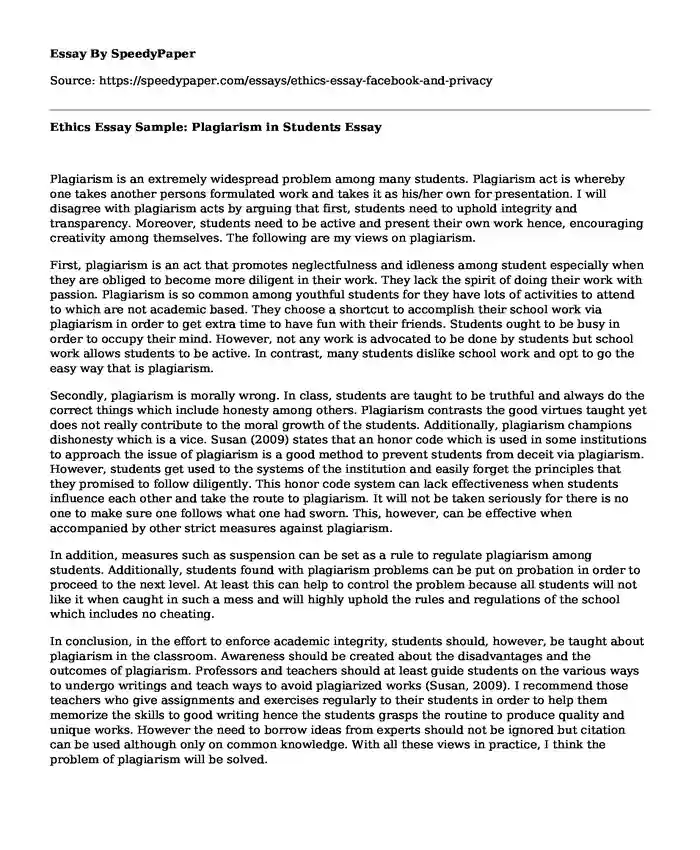Plagiarism is an extremely widespread problem among many students. Plagiarism act is whereby one takes another persons formulated work and takes it as his/her own for presentation. I will disagree with plagiarism acts by arguing that first, students need to uphold integrity and transparency. Moreover, students need to be active and present their own work hence, encouraging creativity among themselves. The following are my views on plagiarism.
First, plagiarism is an act that promotes neglectfulness and idleness among student especially when they are obliged to become more diligent in their work. They lack the spirit of doing their work with passion. Plagiarism is so common among youthful students for they have lots of activities to attend to which are not academic based. They choose a shortcut to accomplish their school work via plagiarism in order to get extra time to have fun with their friends. Students ought to be busy in order to occupy their mind. However, not any work is advocated to be done by students but school work allows students to be active. In contrast, many students dislike school work and opt to go the easy way that is plagiarism.
Secondly, plagiarism is morally wrong. In class, students are taught to be truthful and always do the correct things which include honesty among others. Plagiarism contrasts the good virtues taught yet does not really contribute to the moral growth of the students. Additionally, plagiarism champions dishonesty which is a vice. Susan (2009) states that an honor code which is used in some institutions to approach the issue of plagiarism is a good method to prevent students from deceit via plagiarism. However, students get used to the systems of the institution and easily forget the principles that they promised to follow diligently. This honor code system can lack effectiveness when students influence each other and take the route to plagiarism. It will not be taken seriously for there is no one to make sure one follows what one had sworn. This, however, can be effective when accompanied by other strict measures against plagiarism.
In addition, measures such as suspension can be set as a rule to regulate plagiarism among students. Additionally, students found with plagiarism problems can be put on probation in order to proceed to the next level. At least this can help to control the problem because all students will not like it when caught in such a mess and will highly uphold the rules and regulations of the school which includes no cheating.
In conclusion, in the effort to enforce academic integrity, students should, however, be taught about plagiarism in the classroom. Awareness should be created about the disadvantages and the outcomes of plagiarism. Professors and teachers should at least guide students on the various ways to undergo writings and teach ways to avoid plagiarized works (Susan, 2009). I recommend those teachers who give assignments and exercises regularly to their students in order to help them memorize the skills to good writing hence the students grasps the routine to produce quality and unique works. However the need to borrow ideas from experts should not be ignored but citation can be used although only on common knowledge. With all these views in practice, I think the problem of plagiarism will be solved.
Reference
Academic Integrity and Student Plagiarism: a Question of Education, Not Ethics - The Chronicle of Higher Education. (n.d.). Retrieved from http://chronicle.com/article/Academic-IntegrityStud/32323/
Cite this page
Ethics Essay Sample: Plagiarism in Students. (2019, Sep 27). Retrieved from https://speedypaper.net/essays/ethics-essay-facebook-and-privacy
Request Removal
If you are the original author of this essay and no longer wish to have it published on the SpeedyPaper website, please click below to request its removal:
- Psychology Essay Example on Measuring Personality in Childhood
- Essay Example on Power, Race, and Prison Structure in Modern British Prisons
- Free Essay on Examples of Biotechnology That Have Made Improvement in My Life
- Behavior of Markets - Macroeconomics Essay Example
- Business Essay Sample: Organizational Merger Plan
- Free Essay: The Role of CRM in Supply Chain Management
- Free Essay: Maternity and Theology in Anne Bradstreet's Writings as Presented by Kimberly Latta
Popular categories





